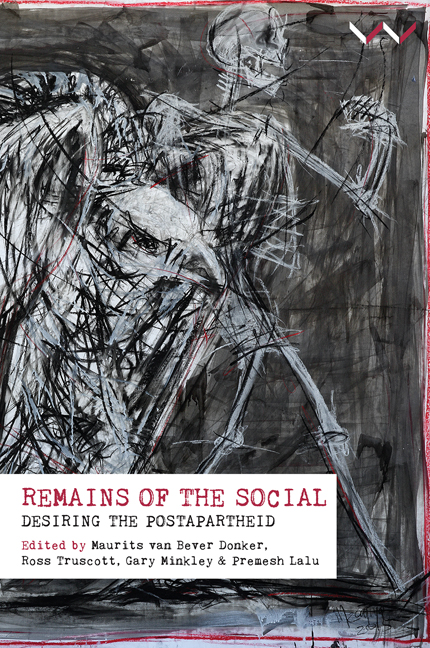Book contents
- Frontmatter
- Contents
- Acknowledgements
- Preface
- Chapter 1 Traversing the Social
- Chapter 2 The Mandela Imaginary: Reflections on Post-Reconciliation Libidinal Economy
- Chapter 3 The Return of Empathy: Postapartheid Fellow Feeling
- Chapter 4 The Ethics of Precarity: Judith Butler's Reluctant Universalism
- Chapter 5 Hannah Arendt's Work of Mourning: The Politics of Loss, ‘the Rise of the Social’ and the Ends of Apartheid
- Chapter 6 Souvenir
- Chapter 7 Re-Cover: Afrikaans Rock, Apartheid's Children and the Work of the Cover
- Chapter 8 The Graves of Dimbaza: Temporal Remains
- Chapter 9 The Principle of Insufficiency: Ethics and Community at the Edge of the Social
- Chapter 10 The Trojan Horse and the ‘Becoming Technical of the Human’
- About the Contributors
- List of Figures
- Index
Chapter 3 - The Return of Empathy: Postapartheid Fellow Feeling
Published online by Cambridge University Press: 21 April 2018
- Frontmatter
- Contents
- Acknowledgements
- Preface
- Chapter 1 Traversing the Social
- Chapter 2 The Mandela Imaginary: Reflections on Post-Reconciliation Libidinal Economy
- Chapter 3 The Return of Empathy: Postapartheid Fellow Feeling
- Chapter 4 The Ethics of Precarity: Judith Butler's Reluctant Universalism
- Chapter 5 Hannah Arendt's Work of Mourning: The Politics of Loss, ‘the Rise of the Social’ and the Ends of Apartheid
- Chapter 6 Souvenir
- Chapter 7 Re-Cover: Afrikaans Rock, Apartheid's Children and the Work of the Cover
- Chapter 8 The Graves of Dimbaza: Temporal Remains
- Chapter 9 The Principle of Insufficiency: Ethics and Community at the Edge of the Social
- Chapter 10 The Trojan Horse and the ‘Becoming Technical of the Human’
- About the Contributors
- List of Figures
- Index
Summary
Empathy between those whom apartheid inscribed as different is widely and confidently posited as a threshold of postapartheid transformation; it is said to mark, if not the arrival of a postapartheid psychosocial condition, then at least the assurance that things are on the right track. At a moment when student movements are coalescing around ‘black pain’ and ‘black anger’, it seems worthwhile pausing to consider what has become an assumed good, an ethical response affirmed without question. The assertion of empathy as a postapartheid condition, however, is not new. Around the Truth and Reconciliation Commission (TRC) of South Africa it was argued, largely in the language of psychoanalysis, that empathy stands as a break with patterns of colonial and apartheid domination, the most well-known case being A Human Being Died That Night. In it Pumla Gobodo-Madikizela gives an account of her interviews with Eugene de Kock, commanding officer of apartheid's counterinsurgency police unit based at the notorious Vlakplaas farm, with whom she came to identify and empathise, their encounter awakening his ‘human’ capacity for empathy. It is this particular kind of argument that I want to pressure here.
The aim of this chapter is not to foreclose on empathy as a postapartheid condition but, rather, to offer a critique that might make the concept of empathy adequate to the present historical moment in which South African psychosocial transformation has shuddered and stalled. In staging my concerns, I take the work of South African artist Nandipha Mntambo, specifically her collection of installations and images in The Encounter, as a provocation that asks us to think again about empathy. I regard Mntambo here as a philosophical accomplice rather than an analysand. In short, I want to think with Mntambo's The Encounter rather than about her artwork.
It has been suggested that Mntambo's work, like that of photographer Zanele Muholi, elicits empathy from the viewer that their work calls for empathy.1 It is worth briefly following the contours of this claim. Regarding Muholi's work, Tamar Garb, for instance, argues that ‘photographic history provides a resource, not only of critique but of play. Deadly serious about the visual cliches of an oppressive iconographic tradition, she, like the people she portrays, feels free to use them as she likes, exposing their ethnic essentialism while queering their modes of address’ (17).
- Type
- Chapter
- Information
- Remains of the SocialDesiring the Postapartheid, pp. 65 - 91Publisher: Wits University PressPrint publication year: 2017



